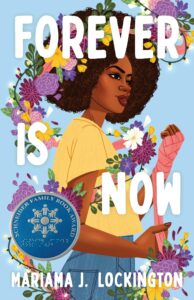"Forever Is Now" Is a Strong, Delicate, and Lyrical Reclamation
In Mariama J.Lockington’s novel-in-verse Forever Is Now, Sadie is a Black bisexual teenage girl with anxiety whose world shatters after two life-changing events.
 Not only does her girlfriend deliver bad news, but the two of them also witness an incident of police brutality on a nearby lake. As a result, Sadie’s dormant agoraphobia comes out in full force. While taking the steps to heal and manage her mental health, Sadie gradually rebuilds a safe place inside herself while finding the strength to use her voice.
Not only does her girlfriend deliver bad news, but the two of them also witness an incident of police brutality on a nearby lake. As a result, Sadie’s dormant agoraphobia comes out in full force. While taking the steps to heal and manage her mental health, Sadie gradually rebuilds a safe place inside herself while finding the strength to use her voice.
One of the best things about this book is how it handles so many sensitive topics, including police brutality, mental health, social justice, transracial adoption, biphobia, and internalized anti-Blackness. This is mainly done through the book’s impressive cast of characters: Sadie; her young brother, Charlie; Sadie’s parents; Sadie’s love interest, Jackson; Sadie’s ex, Aria; Sadie’s best friend, Evan; and Sadie’s therapist, Dr. Candace. Of these characters, the most notable in addition to Sadie herself are Evan (a nonbinary Latinx activist), Jackson (a Black boy adopted by white parents), and Dr. Candace (a Black therapist). While all of the secondary characters inform Sadie’s growth throughout the book, it is these three who bring out the best and sometimes the worst in Sadie. Evan, for example, is empathetic toward Sadie’s mental health needs but initially tries to encourage Sadie to only date girls. Likewise, Jackson is able to bond with Sadie due to his own mental health struggles, but his internalized anti-Blackness initially clashes with Sadie’s racial pride and her own activism. Eventually, Evan and Jackson grow alongside Sadie to stand by her side. Dr. Candace’s online and in-person sessions with Sadie meanwhile provide an insightful and realistic perspective on Sadie’s mental health journey.
Enhancing Sadie’s character arc and the voice of the secondary characters is the book’s frankly gorgeous poetic verse and prose. Some of the most notable verses provide a glimpse into Sadie’s mental health struggles, such as the lines, “When I panic, I stop being a girl / I become a thread unraveling / from some dark and blanketed expanse of time.” These lines discuss Sadie’s panic attacks, but not all the verses are about pain. Some are also resilient and triumphant, such as the lines, “I let the cool air hit my face, the sunshine / on my skin through the window like an old friend. / I remember that loneliness / is a part of my bloodline / as much as love, and fight, and song is.” Sadie’s poetic voice eventually reaches a beautiful climactic peak near the end of the book, and it is a great demonstration of her personal growth.
While the book is mostly written in verse, there is some prose on occasion. The most notable use of prose is when Sadie live-streams (“lives”) on Ruckus, an app that is like the activist version of Tik-Tok. At first, she uses the lives to discuss her mental health, but she soon shifts to using lives to reclaim her joy and activism. I especially liked how Sadie used her lives to discuss her personal influences, including writers like Emily Dickinson, Audre Lorde, and Octavia Butler.
The book has few flaws. I did want to know what happened in the aftermath of the its open-mic event, but I’m okay with not knowing. After all, Sadie didn’t set out to save the world—only to use her voice to inspire who she can.
Some readers might find Sadie’s mental health journey too messy, but that’s the point. Healing isn’t linear, and Sadie isn’t perfect, but she is a wonderful and beautiful survivor in all her complexity. Forever Is Now is a strong, delicate lyrical triumph that shows you can reclaim your peace and help others do the same.

The Afro YA promotes black young adult authors and YA books with black characters, especially those that influence Pennington, an aspiring YA author who believes that black YA readers need diverse books, creators, and stories so that they don’t have to search for their experiences like she did.
Latonya Pennington is a poet and freelance pop culture critic. Their freelance work can also be found at PRIDE, Wear Your Voice magazine, and Black Sci-fi. As a poet, they have been published in Fiyah Lit magazine, Scribes of Nyota, and Argot magazine among others.

